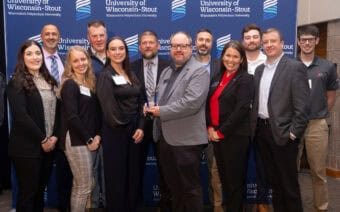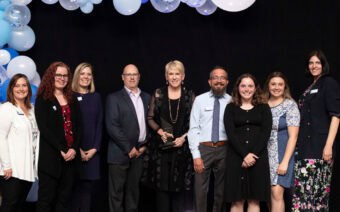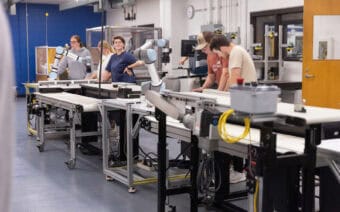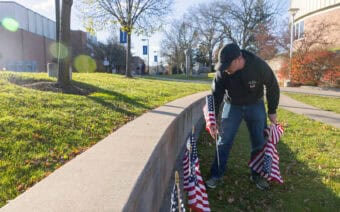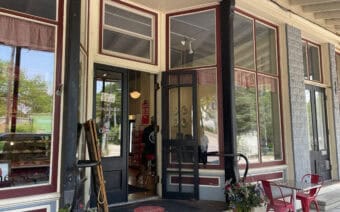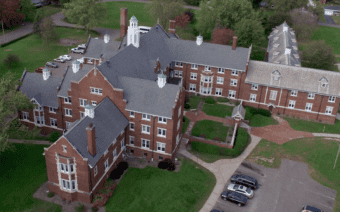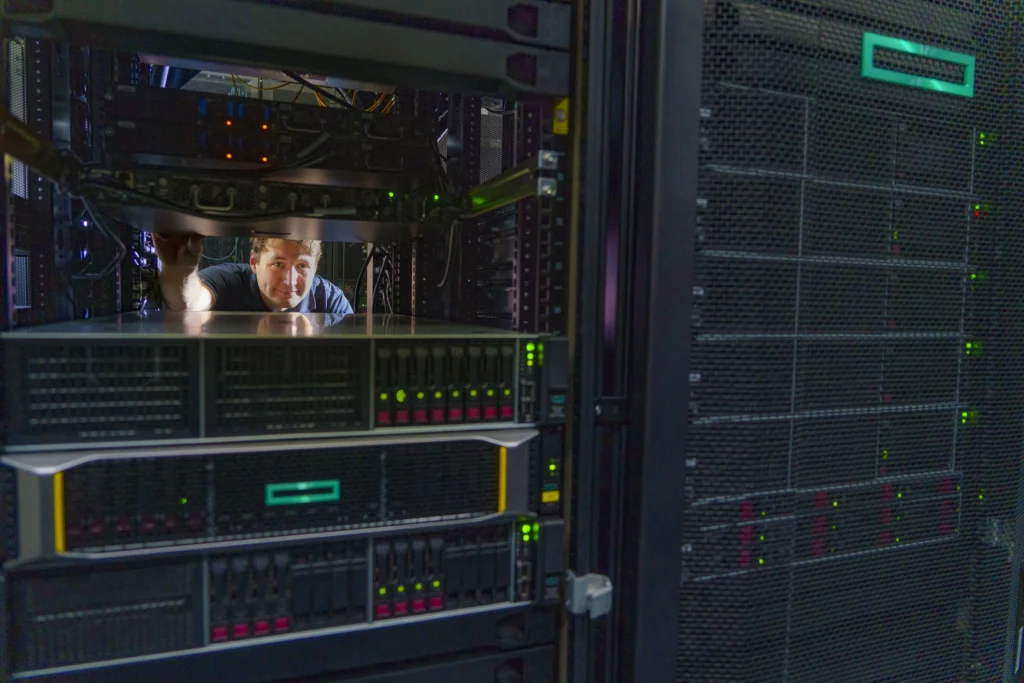
April 29, 2024
EAU CLAIRE – A partnership between the University of Wisconsin-Eau Claire (UWEC) and Hewlett Packard Enterprise (HPE) is paying dividends for the school’s faculty and students.
This month marks the third anniversary of the partnership, which aimed to dramatically increase UWEC’s supercomputing processing power.
HPE provided the university with one of its Apollo servers with Slingshot (Cray hardware) – which Doug Dunham, chair of UWEC’s materials science and biomedical engineering programs and director of the Materials Science and Engineering Center, said has opened the door to fast, data-driven research, as well as the creation of the Blugold Center for High-Performance Computing.
“Students and faculty across the university have access to this supercomputer,” he said. “It’s had a huge impact on faculty and students and allowed for more research, especially in the STEM area.”
A bit of background
Dunham said the project began in 2021 when the university first applied for a grant through the National Science Foundation to enhance its computing power.
HPE, he said, stepped forward to offer an Apollo server, making UWEC the first university nationwide to use the technology.
The project was funded through the UWEC Foundation, which Dunham said secured an in-kind grant of $363,426 in hardware from Hewlett Packard Enterprise and a $350,000 grant from the National Science Foundation to support the center.
The university’s College of Arts and Sciences and the Office of Research and Sponsored Programs, he said, contributed another $20,000 to the project.
According to Dunham, the HPE Apollo System consists of 62 computer servers that can do computations up to 100 times faster than what was previously possible on campus.
“This isn’t something you would normally find at a college our size,” he said. “It is something a large research university would have, so we are so fortunate to have it.”
Dunham said several programs throughout the university use the supercomputer, not just the computer science program.
He said it has been used in 22 courses in the past two years, with more than 1,500 students accessing it.
Capabilities
With its fast processing speed, Dunham said the supercomputer handles a range of actions from easily handling complicated calculations that regular computers can’t handle to quickly comparing numerous images.
He said students have used it to conduct research in areas from deep learning and artificial intelligence to data mining and computational number theories.
“Its use has spread across the college’s disciplines,” he said. “We make use of it as much as possible.”
That, Dunham said, includes the upcoming Upward Bound program, a federally funded initiative aimed at helping prepare high school students for the college application process and success in college.
“It’s a great opportunity for these students to be exposed to this kind of computing power,” he said.
Dunham said faculty and students can access the supercomputer from anywhere – with each user being given individual log-in information.
Continued positives
Dunham said the university continues to spread the word among faculty about how they can use the supercomputer in their courses or research.
Having the supercomputer, he said, has also helped retain and recruit faculty.
“We have a small cluster of faculty involved in high-performance computation work, and being able to say we have this supercomputer on campus is a big draw as we look to grow staff in that area,” he said.
Access to Apollo, Dunham said, also helps in the recruitment of students interested in computer science.
“There are not many places where students can work with this kind of computing power, especially at a school the size of UWEC,” he said.
Even further
The partnership with Hewlett Packard Enterprise, Dunham said, goes beyond the supercomputer.
The company, he said, is helping sponsor the upcoming 24th annual Institute of Electrical and Electronics Engineers (IEEE) International Conference on Electro Information Technology.
The focus of the conference, Dunham said, is on basic/applied research results in the fields of electrical and computer engineering as they relate to electrical and computer engineering, information technology and related applications.
The event runs from May 30 to June 1, which he said will bring people from around the world to the Eau Claire campus.
 Kundinger Inc. partners with AUBO Robotics USA
Kundinger Inc. partners with AUBO Robotics USA ENT & Allergy Associates opening new clinic in Stevens Point
ENT & Allergy Associates opening new clinic in Stevens Point


